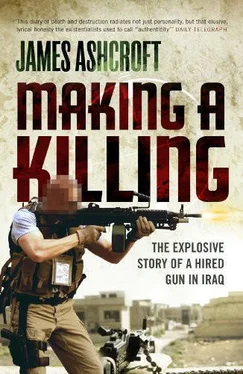The bloodiest violence came from Sunni and Shia militias targeting each other’s civilian populations and religious leaders. Sunni Iraqis occasionally killed Sunni Arab foreign fighters and helped Iraqi and American forces to kill them in disgust at their bombings of civilians and also when their attempts to impose the strict fundamentalist values of the Salafis annoyed the Iraqis. Rival Shi’ite groups were also killing each other in blatant attempts to gain power in what were not much more than turf wars. Attacks on Americans and Multi-National Forces were just a bonus for these groups, but were not necessarily the main focus of foreign fighters motivated by either jihad or money.
‘Well, it doesn’t seem like a problem to me, we should just stay away and let these fuckers kill each other,’ said Colonel Hind.
‘So if there was a journalist here, you would be happy to give a statement for the record that in your opinion, the United States has no obligation to impose any sort of order or stop the slaughter of hundreds of Iraqi civilians every month?’ He started gaping like a goldfish but I didn’t let him answer. ‘Well, I can tell you, John, if you want to impress this two-star, there is one thing that it is essential you understand.’
‘Oh, yeah?’ He leaned forward attentively. That had got his attention all right.
‘I bet you a month’s pay that he is under pressure to come up with a way to tell Rumsfeld how to get the US forces out of here as soon as possible.’
The relentless pressure for an accelerated withdrawal of US troops was the primary reason for the ‘Iraqification’ nightmare. Every project managed by Westerners was facing a punishing deadline to hand over responsibility to the Iraqis.
‘Your problem is that you cannot withdraw until the fighting dies down. How can you do that if you don’t understand what these dozen different factions want?’ I asked him.
‘We don’t need to know what they want, we just need to know that they die easy,’ laughed some major I didn’t know sitting next to John Hind. He blew smoke off an imaginary gun and everyone laughed.
‘Well, that’s just what’s getting American soldiers killed every day. Did they teach you that at West Point?’ I asked him quite calmly. ‘It doesn’t matter how many AIF you kill, there will always be more of them until you take away what they are fighting for. As a professional soldier I would find it difficult to prevent the enemy from achieving his objectives if I didn’t know what they were to start with.’
Everyone agreed with that but they weren’t happy with what I came up with next.
‘So my first point is that you don’t know what your enemies are trying to achieve, the second is that you don’t know what you are trying to achieve.’
‘What?’
‘That’s your problem, mate, half the American soldiers I’ve met think we’re here because of 9/11, fighting Al Qaeda.’ I pointed over my shoulder at the mural of the twin towers painted on the wall behind me.
‘What the hell are you talking about? That is why we’re here. We’re fighting them here so that we don’t have to fight them on American soil.’ Colonel Hind glared at me in angry bewilderment.
There was a chorus of enthusiastic agreement from the officers sitting at the tables around us and I realised that we had attracted a small audience. Mad Dog and Gareth had joined us but remained silent. They had spent enough time listening to contractors’ debates on the war to have open minds. In the US military, however, anyone not 100 per cent ‘with the programme’ was in danger of being labelled an unpatriotic enemy sympathiser. ‘You’re either with us or against us,’ as Mr Bush had said.
So I educated them. I told them that Osama bin Laden had hated Saddam’s secular Ba’ath party and had regularly referred to him as a devil in his speeches, and that vice versa, Saddam had banned Al Qaeda from Iraq.
‘What’s more,’ I continued, ‘after the Soviets withdrew from Afghanistan in 1989 there were thousands of mujaheddin with no one to fight, many of whom ended up in Al Qaeda. After Saddam invaded Kuwait in 1990, and allied forces were preparing troop build-ups in the Gulf, how many of you know that Osama bin Laden offered the use of Al Qaeda’s fighters to Saudi Arabia to use in any conflict against Iraq?’
They were dumbstruck. Even Mad Dog raised an eyebrow.
‘I’m not making this up. Go read a history book. Al Qaeda and Iraq hated each other. And if you want to talk about 9/11, none of the hijackers came from Iraq. Four were from various Middle Eastern countries. Does anyone want to tell me where the other fifteen came from? Can anyone tell me where Osama bin Laden is from? Where did the money for the op come from?’
No one said anything because they all knew the answer.
‘All from Saudi Arabia.’ I looked around. ‘So why the fuck are we all sitting here in Iraq?’
Colonel Hind was puce. I wondered if I kept pushing whether he would have a stroke. The others seemed genuinely attentive so I carried on explaining why I thought the invasion of Iraq had nothing to do with fighting Al Qaeda.
The war on terrorism had been going very well in Afghanistan, I said. Small, elite units operating with good intelligence had greatly reduced Al Qaeda’s command structure at the same time as conventional forces destroyed its fighters and resources in the field. Then in 2002–3, much of that elite force and their CIA colleagues had been transferred to Baghdad to chase down former Ba’athists on the Coalition hitlist. But the cost of removing manpower from Afghanistan to track Saddam’s former commanders and ministers could be seen in the falling number of high-ranking Al Qaeda leaders then killed or captured. In 2002, the CIA issued a list of thirty Al Qaeda commanders whose unique experience and technical expertise were irreplaceable to the enemy. Of those thirty, in 2002, eight were caught or killed; in 2003, only five. In 2004 there was only one caught, trying to smuggle himself into Iraq.
Ms Frances Townsend, the Counter-terrorism and Homeland Security Advisor to the White House from May 2004, said that a clear measure of the United States’ success against terrorism was ‘every day that goes by that America doesn’t suffer another attack’. In that case I would then also like to heartily congratulate Monaco, Luxembourg and the Kingdom of Bhutan for their successes against international terrorism.
To my mind a twofold strategy to deal with Islamist international terrorism made sense. First, deal with the hard-core leadership cadres. Secondly, reduce international recruitment for new militants. Numerous political leaders had agreed before the war that the invasion of Iraq would greatly increase the threat of international terrorism. It had given Osama bin Laden an overwhelming media victory; every subsequent terrorist act could now be justified as being in defence of Islam. There had been a worldwide increase in sympathy, political support, funds and recruits to Islamist cells who were widely dispersed and often unknown to the authorities. There had also been hundreds killed by bombings in Madrid, London, Bali, Istanbul and Egypt in direct response to the war in Iraq. So 9/11 clearly did not make sense as a reason. So why had they invaded? My little audience came up with the standard rationales and I shot them down.
WMDs? Rubbish. Report after report had failed to find any evidence before the war and so many of the famous satellite photos Colin Powell pointed out on television were now admitted to be ‘mistakes’. The British case presented to Parliament was even worse, with excerpts from some student thesis several years old taken off the Internet put forward as ‘intelligence’. Anyway, if you wanted to find WMDs, why not invade North Korea, which has a nuclear capability and a robust bio-weapons programme? Or Iran, which clearly does not need to refine uranium when they are sitting on top of an ocean of oil and the largest gas reserves in the world?
Читать дальше












